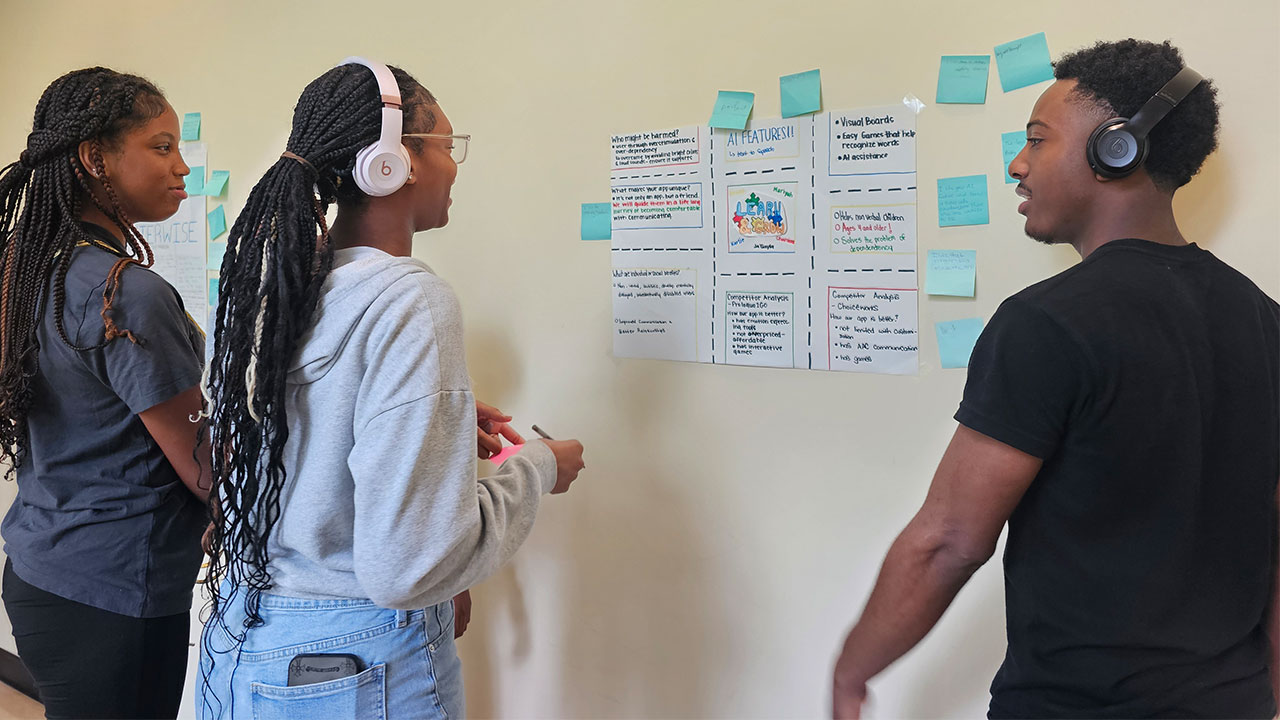content body

This summer, 42 high school students from Alabama’s Black Belt region spent four weeks learning software design processes and sketching out their own mobile app prototypes —discovering just how far their creativity and problem-solving skills could take them.
It was all part of ITEST Alabama — short for Innovative Technology Experiences for Students and Teachers — a National Science Foundation–funded collaboration between Auburn University’s College of Education and Tuskegee University.
ITEST Alabama has been offered for the past four years, providing computer science learning experiences to more than 150 Alabama high schoolers. Over half of the participants have been girls, contributing to an increasing female representation in the field of STEM (Science, Technology, Engineering and Mathematics).

The 2025 participants of the Innovative Technology Experiences for Students and Teachers are pictured along with Dr. Jung Won Hur (front left), a professor in Auburn’s College of Education who facilitates the program’s summer and fall sessions.
A familiar face to many of the students this summer was Dr. Jung Won Hur, a professor in Auburn’s College of Education who facilitates the program’s summer and fall sessions.
“Working with 30-40 high schoolers every year, all coming in with different skill levels and interests, has been quite the ride,” Hur said. “What really keeps me going is just seeing how eager they are to learn and grow. It was incredibly moving to hear them speak about understanding financial hardship and their desire to work hard for a better life — not just for themselves, but to give back to their communities.”
Held July 1–25, the 2025 Summer Academy introduced students to coding through a tool called MIT App Inventor, a beginner-friendly platform for building mobile apps. The academy, externally evaluated by Chih-hsuan Wang, also featured the following guest speakers: Andrew Pendola, Jason Bryant, Travis Smith, Kendra Payne (doctoral student in Educational Psychology), and Janice Sagar (doctoral student in Educational Leadership).
Students not only learned technical skills but also practiced breaking big problems into smaller ones, thinking creatively and collaborating with peers.
“Through the program, I’ve learned how to solve problems by breaking them into smaller tasks. MIT App Inventor helped me think creatively in a way I never thought I would,” 2025 participant Etornam Avuglah said.
And the learning won’t stop with summer. Of the 42 students who took part, 35 have committed to continuing into the fall semester’s Mobile App Development phase — a semester-long project where they’ll meet monthly via Zoom to design their own apps and deepen their computer science knowledge.

Some students leave ITEST with a newfound career direction.
“I was very conflicted on what career I wanted to choose when I graduate, but this program finally made me choose a career in CS (Computer Science),” 2024 participant Kaytlin Langford said.
The program’s impact can be seen years later. Two 2022 participants, twin sisters Chloe and Camille Campbell, are now engineering majors at Auburn University. Chloe said the program “gave me a firsthand look at the rigor, expectations and experiences required in engineering,” while Camille credited it with inspiring her to pursue quantum computing and robotics.
“This project has been a huge success, and our partnership with Auburn University has helped us provide meaningful learning opportunities to local high school students who otherwise had limited access to these experiences,” said Jay Bhuyan, the project’s principal investigator at Tuskegee University.
After another successful summer, ITEST Alabama’s leaders say they’re eager to see how students will build on their skills — and their confidence — in the months ahead.
“Their drive and willingness to learn consistently inspire me to help them out in any way I can,” Hur said.




